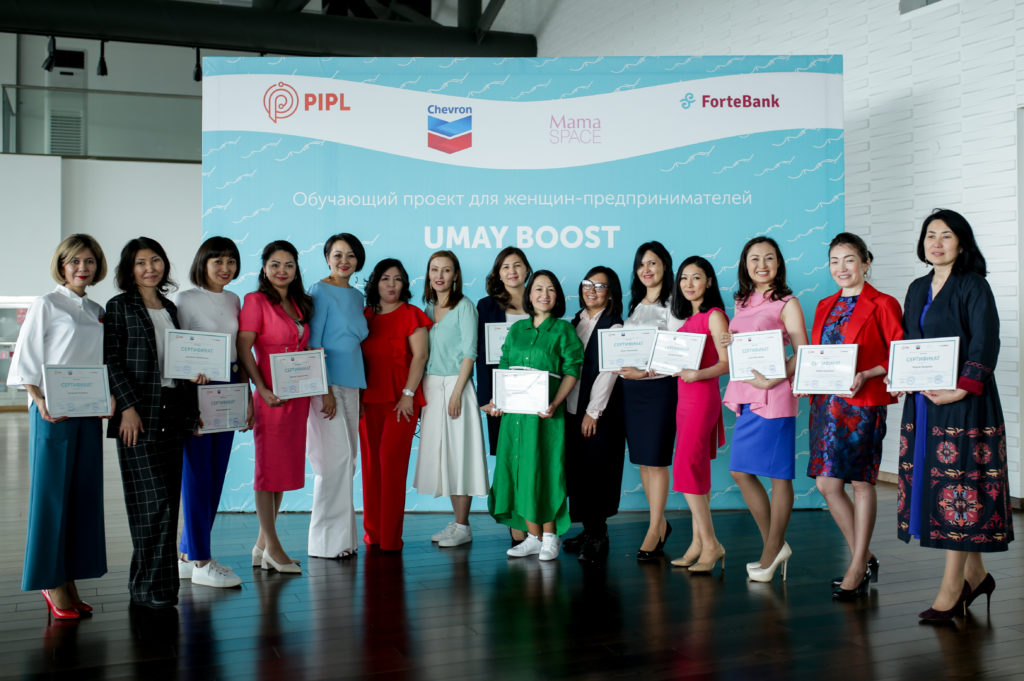NUR-SULTAN – The first round of the UMAY Boost business education project to increase the practical skills and knowledge of Kazakhstan’s women entrepreneurs has concluded. The Nur-Sultan course offered professional training and life-coaching sessions with the goal of building specific capabilities, but also transforming and widening the business vision of participants, inspiring them to build partnerships and create opportunities to scale their enterprises.
Chevron and Fortebank supported the project.
“The idea of this project stemmed from the UMAY Global Summit organised as part of the Women Entrepreneurship Day movement in December. I am the ambassador of Women Entrepreneurship Day for Kazakhstan and CIS [Commonwealth of Independent States] countries,” Merey Mustafina, the project organiser, told The Astana Times.
“This project is a sustainable continuation of the UMAY Global Summit. Last year, I participated in the THNK School of Creative Leadership Programme in Amsterdam, which inspired me to do something similar here in Kazakhstan. We took some elements from that programme, such as coaching, peer to peer help, et cetera, and adapted them to Kazakh business reality. After participating in the programme, I realised that personal changes and transformations happen only when other people help you to see your potential,” she explained.
“Kazakh society demands a lot from women. We are wives, mothers, daughters, and we have to combine our personal life functions with the realisation of our potential in our professions and careers. It is always hard for a woman to harmonise all spheres of her life. My experience at the THNK School of Creative Leadership showed me that like-minded people are the best source of inspiration and motivation,” she said.
“At our UMAY Boost programme, we created an atmosphere of trust and cooperation so that every participant could find the way to personal development.”
The project was announced this winter and received 50 applications. The programme had two main entry requirements: at least three years experience running a business and a yearly turnover of 20 million tenge (US$52,500). Sixteen women entrepreneurs were selected to take part.
“The training started in April and included sessions on strategic planning, business modelling, financial analysis, marketing, sales, human resource management, personal branding and information technology solutions for business. We also introduced coaching sessions into the programme to develop the participants’ soft skills, which are crucial in business. At the final stage of the project, the participants presented their strategic development plan,” Makhabbat Sadvakassova, the project organiser, told The Astana Times.
“We plan to organise UMAY Boost trainings on a regular basis, several times a year. The programme will be amended based on the project results and participants’ feedback. For the next intake, we plan to enrol both men and women. We feel that the format of ‘He for She’ or ‘She for He’ will be more efficient. We believe that men and women have different approaches to business because of their natural gender differences. Men will contribute to the group training by trying to find a rationale for every strategic decision, whereas women will definitely help male participants with developing emotional intelligence, communication and empathy skills necessary for doing business in the 21st century. This balance will make the training more engaging and deliver great results,” Mustafina added.
“We want to scale our project, but it needs funding. We will welcome any help and support for our project. Female entrepreneurship support is a great way for any company to implement its social responsibility policy. Supporting women entrepreneurs means supporting families, children and gender balance in business,” the organisers said.
Maira Karybayeva, a project participant and CEO of the 12 Months building materials retail chain, told The Astana Times the project gave her a kind of support she’d never encountered.
“I have been running a chain of building material stores for 10 years. I never felt any kind of support similar to the support I received at this programme. It is hard to think strategically and see the opportunities when you are isolated from the business community. Things get clear when you are surrounded by people who are also in business and face the same problems as you do. Communication and networking with other businesspeople facilitates the process of exchanging ideas, getting new insights, building partnerships and ultimately expanding the business,” she said. Karybayeva introduced a range of changes in her stores’ everyday processes, based on the things she learned through the UMAY Boost programme. In particular, managers are emphasising service.
“For example, we decided to introduce a free interior design service at our stores. A designer draws a design project with an eye to the materials we have in our store. The service saves our customers time and money. We introduced elements of augmented reality using QR codes, so that our customers can easily visualise how wallpapers or ceramic tile will look in their apartment… A personal shopper now accompanies customers in any sector of the store,” Karybayeva explained.
The changes delivered financial results. The number of customers increased by 2,500. The chain hadn’t seen a revenue increase in 18 months – and saw a 13 percent jump last month, after the changes had been implemented.
“We still have a lot to improve. Thanks to this programme, I am now not afraid of experiments and see points of growth for our business. I believe that even greater achievements are ahead of us,” she said.

